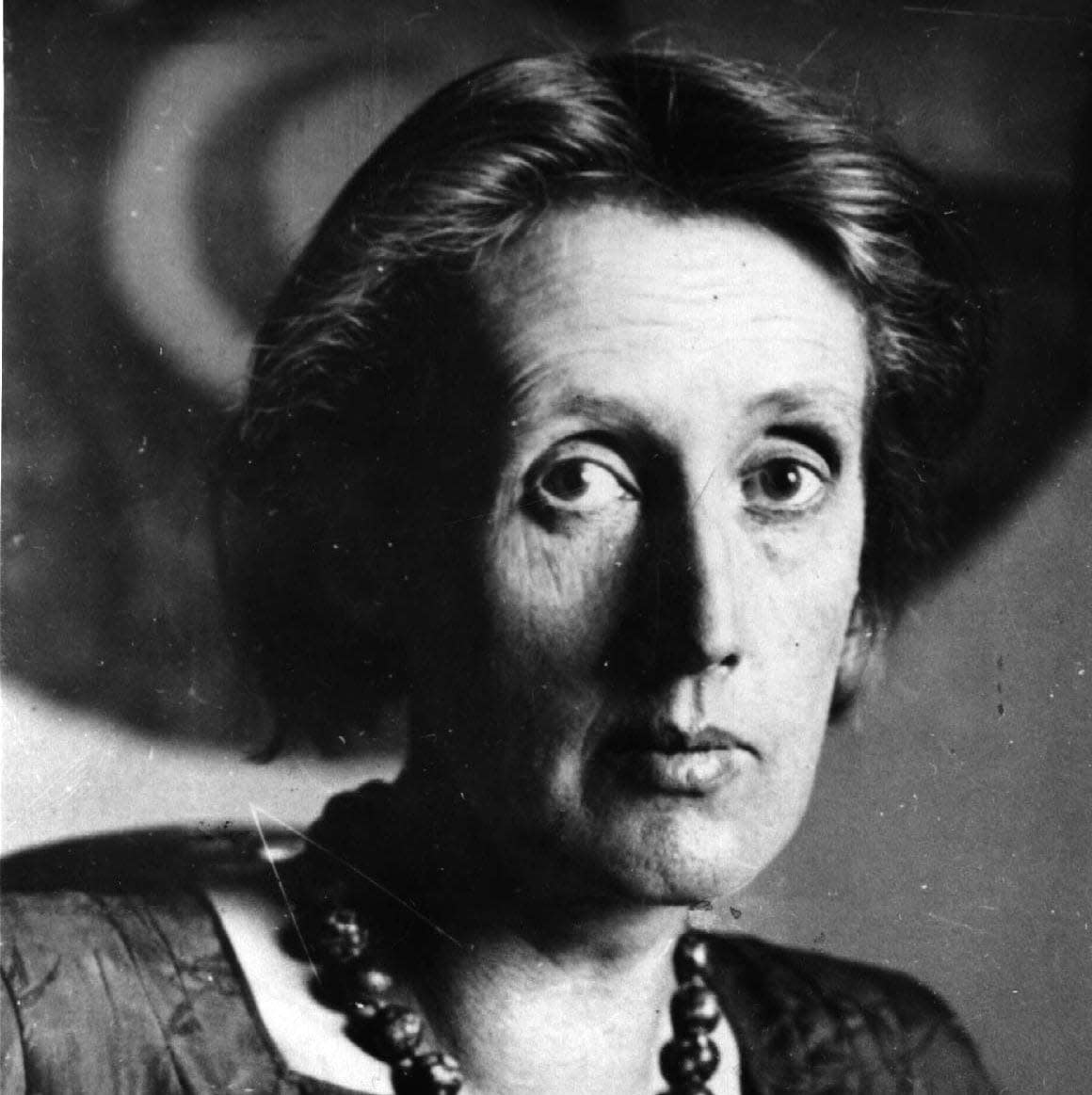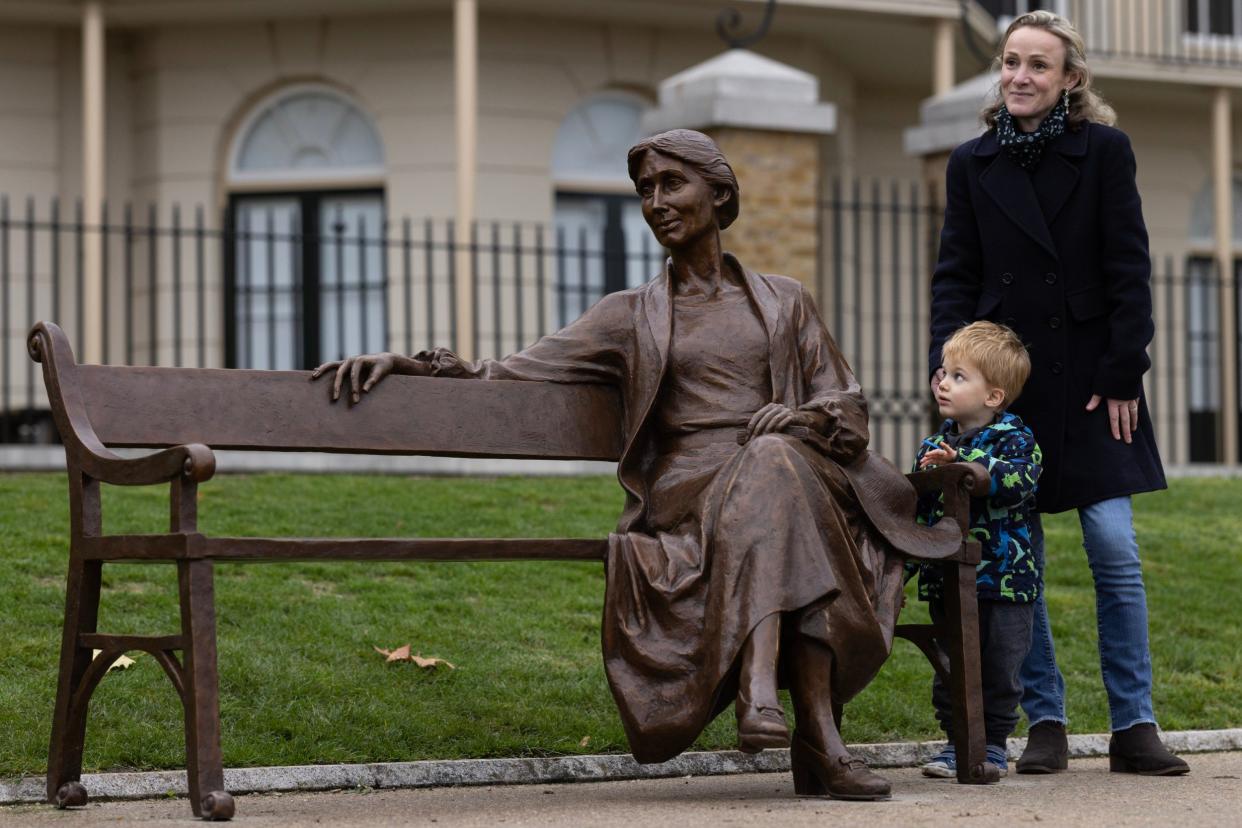The wokerati have ruined a statue of my great-aunt Virginia Woolf. She was no bigot

My great-aunt Virginia’s timeworn statue in Tavistock Square is familiar to many Bloomsbury residents, and a pilgrimage to the many thousands of American, Japanese and European tourists who arrive in WC1 on the Bloomsbury trail throughout the year.
What is not so familiar is the new digital addition, a QR code recently affixed by Camden Council to explain away Virginia Woolf’s apparently “offensive” and “imperialist” attitudes. I first found out about this QR code early on Monday morning when I opened the newspapers. My initial reaction was disbelief. Now it just feels hurtful and disrespectful.

I was born and grew up in Camden. It’s an area steeped in Bloomsbury heritage. The young Virginia and her friends and housemates famously occupied various squares within the Camden Council borough; Tavistock Square, Gordon Square, Fitzroy Square, Brunswick Square – Maynard Keynes, Duncan Grant, Lytton Strachey and Vanessa Bell among other artists, writers and political thinkers. Virginia and Leonard Woolf also married in 1912 in St Pancras Town Hall just down the road.
(It’s notable that one Sir Keir Starmer has been the local MP since 2015… a sign of perhaps more woke QR codes to come under a Labour administration?)

My problem with this whole debacle is that there’s no nuance. Yes, she made irreverent comments and quips to friends in letters, for example, “I’m to marry a penniless Jew”. Of course we wouldn’t use that language now, but she was born 142 years ago. These quotes out of context may well sound anti-Semitic, snobbish and sneering – but she was saying it in a loving, affectionate way. I know that because I’ve read her diaries. There is nothing more intimate than your letters and your diaries when you’re a young woman about to get married. And if we were all judged on things we said or wrote in our 20s, well, we’d all be cringing.
She talks about her mother-in-law, one of my direct relatives, and her Jewish characteristics, but not in a vicious way. She wasn’t cruel. Jews were the “other” back then but her words are never spiteful. It’s a love of humanity. It’s a love of detail and character. She was a writer, for goodness’ sake. She was an observer of life.
Virginia is so often accused of anti-Semitism. But most people will not know that she and Leonard were on Hitler’s blacklist during the 1930s, when Nazism was spreading over Europe. They had their suicide plans drawn up in case Hitler invaded London, which was a very real fear. The anxiety of living through those years, through two world wars in London, massively contributed to her repeated nervous breakdowns and to her eventual suicide in 1941.
So to call her anti-Semitic when she was on Hitler’s radar, for people to say that she was sneering at Jewish people when she was married to Leonard, is just plain ill-informed. She was considered a Jew, and she and Leonard had drawn up plans to die together,
Multifaceted
People have also called her a “snob”, and in some ways a certain snobbishness was inevitable, because she was a Victorian upper middle-class woman. But she was multifaceted too. She became very attached to her housemaids, for example; she cared about them and was involved in their lives to an unusual degree. She would ramble around London, finding inspiration in her beloved streets, making up stories, and delighting in all the different social classes, the sights and sounds of the city.
The strange accusation of “blackface” relates to a practical joke played on the British Navy by the Bloomsbury Group in 1910. This was the so-called Dreadnought Hoax, a jape that Virginia and her band of “jolly savages” found “shriekingly funny”. This was a youthful caper in which they disguised themselves as Abyssinian princes in fake beards and costumes to gain access to the British naval fleet.
I’ve heard people calling her homophobic. But this is a woman who, while frigid and asexual in some ways, had intense female friendships and relationships that may have been physical. She was deeply in love with the author Vita Sackville-West, a mutual passion that was behind the inspiration for Virginia’s gender-bending 1928 novel Orlando.
And what about mental health? She writes honestly, movingly and intensely of her nervous breakdowns. That in itself was new. From her youth she was in and out of hospitals with these breakdowns. She had a terrible time. She didn’t have children because her husband, her sister and the doctors decided that she wasn’t strong enough. She went through a lot.

She was human and was flawed but she was also pushing the boundaries. She was a literary pioneer with her “stream of consciousness” prose – the modernist technique that has changed novel writing forever. Back then, authors didn’t write about what was going on inside. Dickens, Trollope – they wrote about the outside, exterior and characters and the plot of the story. Virginia Woolf, James Joyce and the modernists of that time began to explore what’s going on for us inside as we move through our daily lives. It was utterly groundbreaking. Where is the celebration for that?
What I find particularly depressing is that it’s such a one-note approach; it feels like it’s just appeasing the wokerati. It’s fashionable now for people to entrench on either side without actually bothering to explore the details in the middle. And why does everything have to be absolutely politically correct? She was born in 1882. How can we expect her attitudes to align with ours or with that of the Guardian? It’s clearly madness.
Broad brushstrokes
I’ve been trying to contact Camden Council about the decision-making over the QR code. I’ve left several messages trying to find out who is on this politburo and, essentially, who made this decision and what have they read to inform their opinion. Have they read any of her books? Any of her letters or diaries? Because I would be willing to bet that no one at the council has read a single word of Virginia’s writing. What they have done is a broad brush approach and alarmingly reductive. Are they going to attach a QR code to every statue to apologise for that person’s thoughts and deeds in centuries past?
It’s verging on Orwellian – or is it just irony? This woman was a writer who committed everything she’d ever thought, felt and struggled with on to paper; complex, thoughtful, hard-won words that she’d agonised over. And she’s reduced to a statue in a park with a QR code telling people what to think about her.
I’m a Woolf and fiercely proud of my family and of my great-aunt’s work, so of course I’ll defend her against accusations of racism, anti-Semitism and imperialism. (Imperialist? Her grandfather, Sir James Stephen, drafted the Slavery Abolition Act of 1833.)
I’ve read and re-read her letters and diaries, as well as her books. Virginia’s suicide note to Leonard in 1941 is among one of the most beautiful and moving pieces ever written.
I feel certain I am going mad again. I feel we can’t go through another of those terrible times. And I shan’t recover this time. I begin to hear voices, and I can’t concentrate. So I am doing what seems the best thing to do. You have given me the greatest possible happiness. You have been in every way all that anyone could be. I don’t think two people could have been happier till this terrible disease came.

So does the QR code matter? I think it does. (Will we cover Stratford-upon-Avon in QR codes next?) I want readers to stand next to Virginia’s statue in Tavistock Square with their much-loved and well-thumbed copy of To The Lighthouse - or Mrs Dalloway, perhaps - and think about the London Virginia loved and wrote about. I’d like them to think about those young people living new exciting lives, at the vanguard of new thought, and the bombs and the world wars, women and writing, and how life was more than a century ago.
I don’t want people standing there at the statue, staring at their mobile phone, thinking she was a bigot. She was incredibly human: complex, fragile, both of her time and way ahead of it too. She understood the contradictions of our characters.
I feel sad for Virginia and upset about it for my family. My father Cecil Woolf was the last living person to have known Virginia. He was very close to both her and Leonard as a child and listening to his memories of her, it’s clear that she was an open, curious, irreverent soul.


